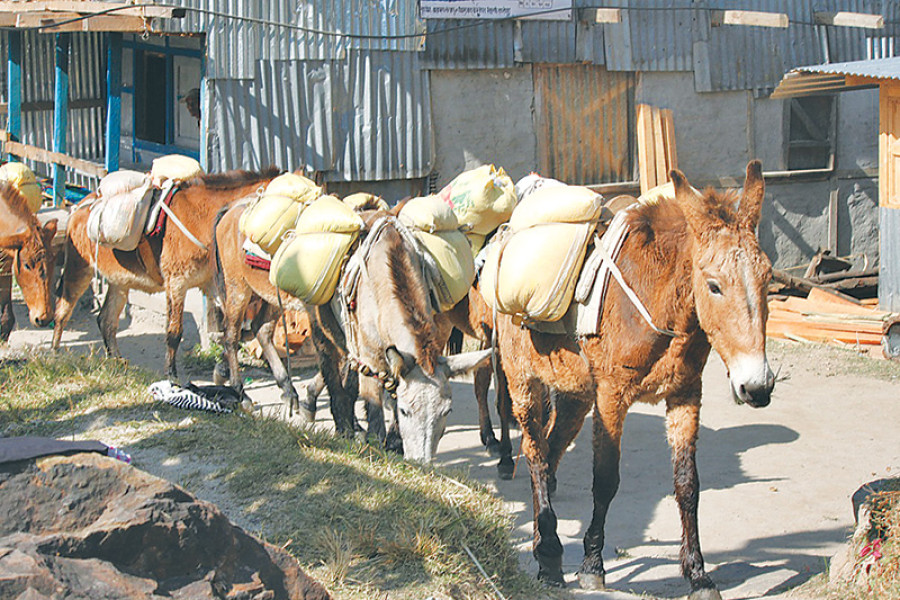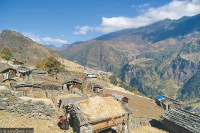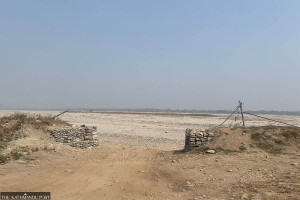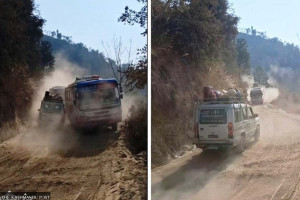Koshi Province
Nepal-China border closure affects northern villages of Sankhuwasabha, Taplejung
Local residents are having a tough time managing essential commodities and finding markets for their products.
Ananda Gautam & Dipendra Shakya
Residents of several settlements in the northern parts of Sankhuwasabha and Taplejung districts are having a tough time managing essential commodities and finding markets for their products due to the protracted closure of the Nepal-China border amid coronavirus threat.
Villagers living near the Nepal-China border are dependent on Tibet for daily essential commodities, as the area is yet to be connected with the national road network. Tibet is also the major market to sell their products that range from medicinal herbs to domesticated animals. The local residents have been greatly affected by the Nepal-China border closure since January.
“The main challenge now is to find food. The local residents used to buy daily supplies from the Tibetan markets but they have not been able to do so since the border closure,” said Phurbu Bhote, the chief administrative officer of Bhotkhola Rural Municipality in Sankhuwasabha.
The northern villages of Sankhuwasabha are hardest hit by food shortages. The residents of Bhotkhola, a remote local unit about five days walk from the district headquarters Khandbari, are greatly affected, as China sealed the Kimathanka border point on January 19 without prior notice.
The district administration had supplied rice, cooking oil, salt and other daily essentials to Bhotkhola on a Nepal Army helicopter in February and distributed the essentials to the settlements that were reeling under food shortage.
According to Bhote, in the wake of the border closure, the residents of Bhotkhola have started transporting rice and other commodities from Mikwakhola Rural Municipality in Taplejung, as it is nearer than Khandbari, the district headquarters.
“They transport goods up to Sanwa by vehicle. The goods are then carried to Thudam of Bhotkhola using mules and porters,” he added. “It takes three days for a mule to transport goods from Sanwa to Bhotkhola.”
The villagers are in a rush to manage food that will last them throughout the year, as the mule track from Sanwa to Thudam is often disrupted by heavy snowfall in winter.
“One cannot use the track when there’s snowfall in the area,” said Dandu Sherpa of Papung in Taplejung.
When the goods finally reach the villages, their prices get exorbitantly high. Nupu Sherpa, a mule trader of Papung, said he charges Rs120 to transport one kilogram of goods from Sanwa to Thutham.
“The work is risky and it takes a week to take the mules to Bhotkhola and back,” said Nupu.
According to Narayan Thapa, the vice-chairman of Taplejung Chamber of Commerce and Industry, a 50kg sack of Mansuli rice costs around Rs 2,300 in Phungling. The same rice costs Rs 8,700 after it is transported to Thudam.
Likewise, the local people have also been unable to find a market for their products, mainly carpets, medicinal herbs and livestock, since the border closure.
According to Tashi Sherpa, a local trader at Olangchungol in Taplejung, Tibet was the main market for the villagers to sell various medicinal herbs like Chiraito, Jatamasi, Kutki and Bikhma. The herbs used to be transported to China from Kimathanka border point in Sankhuwasabha and Olangchungola border point in Taplejung.
“The export of herbs has come to a halt since January. Carpets meant to be sold in Tibetan markets are also gathering dust and hundreds of women used in weaving the carpets have been left unemployed,” he said. “The border should be reopened at the earliest so we can resume the export business.”




 9.6°C Kathmandu
9.6°C Kathmandu













